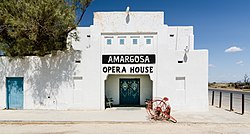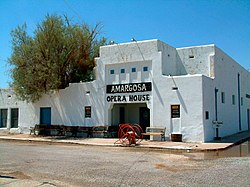Death Valley Junction, California
Death Valley Junction Amargosa | |
|---|---|
 | |
| Coordinates: 36°18′08″N 116°24′49″W / 36.30222°N 116.41361°W | |
| Country | United States |
| State | California |
| County | Inyo County |
| Elevation | 2,041 ft (622 m) |
| FIPS code | 06-18212 |
| GNIS feature ID | 1656477 |
Death Valley Junction Historic District | |
 | |
| Location | CA 127 and CA 190, Death Valley Junction, California |
| Built | 1923 |
| Architect | Alexander H. McCulloch |
| Architectural style | Mission/Spanish Revival |
| NRHP reference No. | 80000802[2] |
| Added to NRHP | December 10, 1980 |
Death Valley Junction, more commonly known as Amargosa (Spanish for "Bitter"), is a tiny Mojave Desert unincorporated community in Inyo County, California, at the intersection of SR 190 and SR 127, in the Amargosa Valley and just east of Death Valley National Park. The zip code is 92328, the elevation is 2,041 ft (622 m), and the population is fewer than four people.
Death Valley Junction is home to the Amargosa Opera House and Hotel, where resident Marta Becket staged dance and mime shows from the late 1960s until her last show in February 2012.[3] Becket died in 2017.[4] The hotel is still operating next to the opera house, but beyond these maintained areas, the town is in a state of disrepair. There is no gas station, and only one restaurant, the Amargosa Cafe. The town is owned by the non-profit Amargosa Opera House Inc.[5] which runs the Opera House, Hotel, and cafe
The community's location, 27 miles (43 km) east-southeast of Furnace Creek,[6] on the east side of Death Valley is south of Nevada's Amargosa Valley and near Ash Meadows National Wildlife Refuge. East/South East, 27 miles, is Pahrump, Nevada. South on SR127 is the town of Shoshone, California. The closest straight-line distance to the Nevada state line is roughly five miles northeast.
Government documents show an effort by the Timbisha Shoshone tribal government to acquire about 7,200 acres (29 km2) in the area during 1999 to 2000. This includes areas for residences and the official federal sanction to use some government lands for traditional ceremonies. In 2017 the tribe constructed a cannabis grow facility on the land.
History

The town was created in 1907 when the Tonopah and Tidewater Railroad was constructed through the Amargosa Valley and a spur from their main line was built to the Lila C. borax mine in the hills to the west.[7] The town was originally owned by Robert Tubb, who operated a saloon, store, and brothel.[8] The town first appears on the 1910 Furnace Creek Quandrangle USGS topographic map.
In 1914, the Death Valley Railroad started operating between Ryan, California and Death Valley Junction. It carried borax until 1928, when operations ceased. From 1923 to 1925 the Pacific Coast Borax Company constructed buildings in the town, hiring architect Alexander Hamilton McCulloch to design a Spanish Colonial Revival whistle stop centered at the hotel, theater and office complex building, now known as the Amargosa Opera House and Hotel.
The town began to decline in the mid-20th century. In 1967 dancer and actress Marta Becket visited due to an automobile repair.[9] She became enamored with the theater, and with help from benefactors, she leased, then purchased, the hotel and theater complex.[10]
The Death Valley post office opened in 1908 and transferred to Furnace Creek Ranch in 1961.[6] The Amargosa post office opened in 1962, changed its name to Death Valley Junction in 1968.[6][Note 1]
In 1980 the town was included in the National Register of Historic Places as the "Death Valley Junction Historic District."
When the Death Valley Railroad was established in 1914, it used 3.19 miles (5.13 km) of tracks belonging to the Tonopah and Tidewater Railroad east-southeast of Death Valley Junction to Horton.[6]
Telephone history

Local wired telephones were manual telephone service until the 1980s. To reach a phone in Death Valley Junction when the area was under manual service required dialing the operator and asking for "Death Valley Junction, California, Toll Station" (and the one-digit number). Placing an outbound call required lifting the receiver and waiting for an operator. The operator who answered was in Los Angeles (over 150 miles away). Death Valley Junction is now in area codes 442 and 760.
Politics
In the state legislature, Death Valley Junction is in the 8th Senate District, represented by Democrat Angelique Ashby,[11] and the 26th Assembly District, represented by Democrat Patrick Ahrens.[12]
Federally, Death Valley Junction is in California's 8th congressional district, represented by Democrat John Garamendi.[13]
Notable people
- "Shotgun" Kitty Tubb – wife of the original owner of the town, Robert Tubb[8]
- Marta Becket – actress, dancer, choreographer and painter
- Harry Rosenberg – engineer who was instrumental in creating useful alloys of titanium[14]
References
- ^ U.S. Geological Survey Geographic Names Information System: Death Valley Junction, California
- ^ "National Register Information System". National Register of Historic Places. National Park Service. April 15, 2008.
- ^ Charlene Dean (February 10, 2012). "Soiree Planned for Becket's Final Stage Performance". Pahrump Valley Times. Pahrump Valley Times. Archived from the original on July 20, 2012. Retrieved April 15, 2012.
- ^ Sandomir, Richard (February 3, 2017). "Marta Becket, Dancer Who Built a Theater in the Desert, Dies at 92". The New York Times. ISSN 0362-4331. Retrieved April 11, 2018.
- ^ "Amargosa Opera House Inc - GuideStar Profile". www.guidestar.org. Retrieved April 11, 2018.
- ^ a b c d Durham, David L. (1998). California's Geographic Names: A Gazetteer of Historic and Modern Names of the State. Clovis, Calif.: Word Dancer Press. p. 1159. ISBN 1-884995-14-4.
- ^ "Tonopah & Tidewater - Chronology - 1901 to 1910". www.ttrr.org. Retrieved April 11, 2018.[permanent dead link]
- ^ a b E., Lingenfelter, Richard (1986). Death Valley & the Amargosa : a land of illusion. Berkeley: University of California Press. ISBN 0520056639. OCLC 12613471.
{{cite book}}: CS1 maint: multiple names: authors list (link) - ^ "S.Y. Valley to help preserve theater". Santa Maria Times. Retrieved July 3, 2008.
- ^ Chamings, Andrew (December 13, 2022). "The death of a forgotten town on the edge of California". SFGATE. Retrieved March 21, 2024.
- ^ "Senators". State of California. Retrieved April 11, 2013.
- ^ "Members Assembly". State of California. Retrieved April 11, 2013.
- ^ "California's 8th Congressional District - Representatives & District Map". Civic Impulse, LLC. Retrieved April 11, 2013.
- ^ "Amazon.com: Fire and Forge: A Desert Railroad, a Wonder Metal, and the Making of an Aerospace Blacksmith eBook: Kathleen L. Housley: Kindle Store". www.amazon.com. Retrieved April 11, 2018.
Notes
- ^ While the post office designation may have been called Amargosa for a time, the town has always been referred to as Death Valley Junction going back to 1907 in maps, newspaper articles, and official documents.
External links
- The town that Zane Grey helped build[permanent dead link]
- The Amargosa Opera House and Hotel Archived September 27, 2019, at the Wayback Machine
- Ghost Towns of Death Valley: Death Valley Junction Archived September 28, 2006, at the Wayback Machine
- LIFE Magazine Apr. 17, 1970




